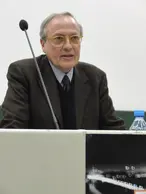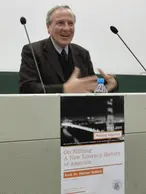Prof. Dr. Werner Sollors (Harvard University): "Making America - Editing a New Literary History of America"
13.01.2011, 14:15 Uhr, U5/00.24
Für Liebhaber der amerikanischen Literatur, und für alle, die sich für Literatur als Teil der Gegenwartskultur begeistern, hat die Bamberger Amerikanistik Prof. Dr. Werner Sollors (Harvard) zu einem Vortrag eingeladen.
Werner Sollors hat eine amerikanische Literaturgeschichte herausgegeben, die aufhorchen lässt. A New Literary History of America (2009) ist eine chronologische Sammlung von 220 kurzen Essays über 220 Momente, an denen sich die amerikanische Literatur für immer verändert hat. Die Autoren sind Akademikerinnen und Aktivisten, Philosophen und Künstlerinnen; die Essays sind pointiert, erfrischend und frei von akademischem Jargon. Wenn Ishmael Reed über Rassenbeziehungen in Huck Finn schreibt, Michael Tolkin über die Sprache von Alcoholics Anonymous und Camille Paglia über Tabubrüche bei Tennessee Williams, wird die amerikanische Literatur neu entdeckt, vielleicht auch neu erfunden. In seinem Vortrag spricht Professor Sollors über die Herausforderungen eines solchen Projekts.
Werner Sollors ist Henry B. and Anne M. Cabot Professor für Englische Literatur und Professor für Afrikanische und Afro-Amerikanische Studien an der Harvard University. Er ist Autor von Beyond Ethnicity: Consent and Descent in American Culture (1986), Neither Black Nor White and Yet Both: Thematic Explorations of Interracial Literature (1997) und Ethnic Modernism (2008).
Review

Are TV shows and advertisements part of American literature? Who decides which texts are included in a literary history? What is the idea behind a Literary History of America not written by experts in literary criticism but by artists, activists, and philosophers? These were some of the questions students, faculty members and guests discussed with Prof. Werner Sollors during his visit to Bamberg University in January 2011. Werner Sollors is Henry B. and Anne M. Cabot Professor of English Literature and Professor of African and African American Studies at Harvard University, and one of today’s foremost Americanists. The event, which was organized in cooperation with American Studies colleagues at the University of Bayreuth and generously supported by the Bayerische Amerika Akademie in Munich, launched the new lecture series “Making America” hosted by Bamberg’s American Studies section.

In his spirited presentation, Werner Sollors talked about his most recent project, A New Literary History of America (2009). This collection of 220 essays about moments of change in American literature and culture includes texts by Ishmael Reed on Hucklerberry Finn, by Camille Paglia on sexuality in Tennessee Williams, and by Michael Tolkin on the Alcoholics Anonymous’ Big Book, thus challenging conventional notions of historical periods and disciplinary boundaries alike. Indeed, as it foregrounds the constructedness of any history in the here and now, the collection can be said to not only rewrite but also reinvent American literature. Werner Sollors’s lecture provided many provocative examples for the challenges involved in such a project, and emphasized the ongoing need to develop fresh and creative interpretations of the relationship between literature and history.

The lecture also demonstrated how much Werner Sollors himself embodies this interdisciplinary understanding of literary and cultural history. All of his key publications — including Beyond Ethnicity: Consent and Descent in American Literature and Culture (1986), Neither Black nor White yet Both: Thematic Explorations of Interracial Literature (1997), and Ethnic Modernism (2008),and the co-edited volumes Theories of Ethnicity (1996) and The Multilingual Anthology of American Literature (2000) — bring various fields of inquiry into a productive dialog, from ethnicity and African American studies to migration, multiculturalism, and multilingualism. Indeed, Sollors was one of the first who pushed for a more inclusive and dynamic understanding of literature: in the late 1970s, he urged that the study of ethnic literatures should include “jokes and advertising, unpublished diaries and bestsellers, folklore and movies.” So the New Literary History of America is perhaps the logical consequence of his long dedication to understanding literature and history as interrelated projects that inflect and resonate with each other. Werner Sollors’s presentation was a prime example of how to make literary history matter today, not only by way of new insights into how American culture is continuously being remade, but also by inspiring us to keep exploring the fields of literature and culture on our own.

